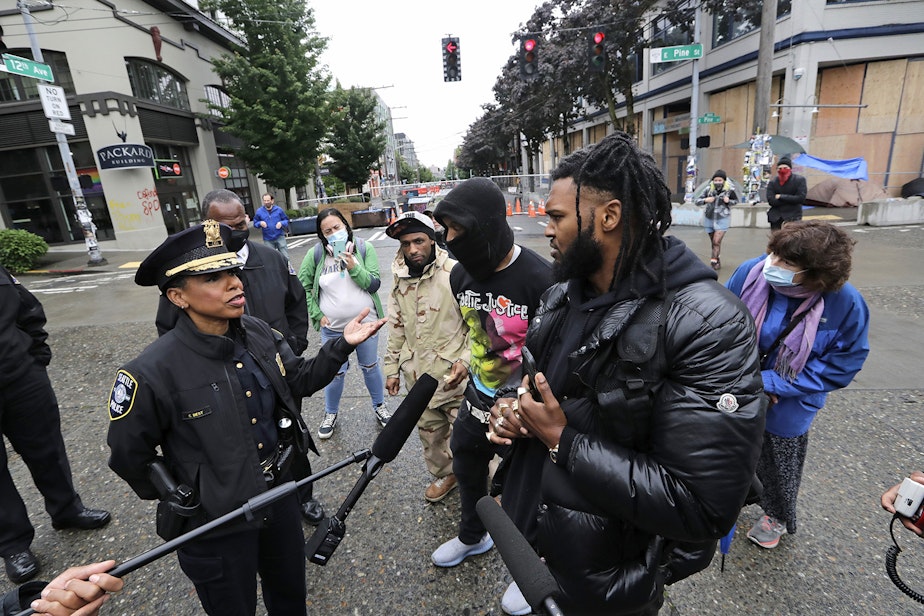Raz Simone to stand trial, with some claims dismissed, judge rules

A Seattle hip-hop artist accused of sex trafficking will have to stand trial in a civil court, a King County judge ruled Friday. However, the judge dismissed some of the claims against Solomon “Raz” Simone because the statute of limitations had passed.
Simone lost his December petition to be summarily dismissed from a lawsuit in which four women alleged he trafficked them over several years. He argued the legal window for the women to bring claims against him had expired in Washington.
King County Superior Court Judge Melinda Young agreed with Simone and his lawyer that three of the four women had run out of time to pursue some of the other claims listed in the suit, including false imprisonment, battery, and assault. But Young said the women’s petition had been timely for bringing civil claims of criminal profiteering, which, under Washington law, includes making money off forced labor.
Extending the statute of limitations is outside her authority, Young said, but is an issue for the Legislature.
“This Court is bound by the law as it currently is, not as the Court may wish it to be,” Young wrote. “An expansion of the statute of limitations must be done by the legislature” or an appellate court.
Sponsored
The lawsuit, filed in fall 2021, alleges a yearslong criminal scheme, in which several women said they were seduced by Simone into a romantic relationship, then forced into stripping or sex work for his profit. Simone, they said, set $1,000 daily quotas and punished the women for failing to follow his rules. Many of the women said he beat, raped, and at times confined them at his Airport Way recording studio in Seattle. Simone has repeatedly denied the allegations.
The plaintiffs in the lawsuit also went to Seattle police, according to public records, emails, text messages, and hours of interviews with KUOW and The Seattle Times. To date, no criminal charges related to trafficking allegations have been filed against Simone.
Paul Beattie, Simone’s attorney, commended Young’s decision in an email, saying: “Although the Court did not go my way on several issues, I applaud the Court’s determination to follow the law. If judges won’t do that, we have nothing.”
Ellery Johannessen, one of the plaintiffs’ attorneys, said in a text message, “Overall, we are pleased with the decision, which recognizes that it can take years after the fact for a survivor to understand the pattern of criminal profiteering activity.”
The women’s attorneys had asked the court to suspend the statute of limitations for some of the claims, arguing the trauma Simone inflicted on the women made it difficult for them to swiftly seek a remedy. The attorneys cited a growing comprehension of the years or decades it can take for survivors of sexual violence to talk about what happened to them, let alone seek legal recourse. Some of the allegations against Simone date back a decade.
Sponsored
Young agreed with the plaintiffs’ attorney’s assessment but said it was outside her legal authority to disregard the statute of limitations.
“Plaintiffs lay out a grim story of physical abuse, sexual abuse, sex trafficking, and coercion,” she wrote. “The emotional manipulation detailed … would cause any person to have a lengthy period of time before realizing the scope and magnitude of the harm she suffered, even longer to have the strength to fight against those who caused the harm.”
Young said the women’s overarching claim of criminal profiteering had been appropriately brought by the plaintiffs within the statute of limitations window. The plaintiffs’ realization of their involvement in a larger criminal enterprise could not have occurred until more recently, she said, and they had filed the lawsuit appropriately within the three-year window for that crime.
But the time frame to seek a civil remedy for some of the claims, including sexual assault and battery, had passed for all but one of the women, Young wrote.
Washington has among the nation’s shortest statute of limitations for sex trafficking and sexual assault for civil claims. Other states have taken steps to provide a longer time frame to survivors of these crimes to seek a civil remedy, in part in response to high-profile sex crime investigations involving the Catholic Church, Jeffrey Epstein, and Keith Raniere. But Washington hasn’t amended its civil statutes in two decades.
Sponsored
New York, in contrast, recently extended the statute of limitations for civil trafficking claims to 15 years, five times as long as Washington survivors have to bring claims.
Young on Friday denied two other motions to dismiss, which were sought by a business associate of Simone’s and by Talents Northwest, the owner of the strip club where at least one woman says she was forced by Simone into sex work.
Last November, Young also denied motions by the city of Seattle and the Seattle Police Department to be dismissed from the suit. The city and the department are listed as defendants for negligent investigation and supervision of the investigation into Simone.
The case is scheduled to go to trial in November.
Ashley Hiruko: 206-574-8007 or hiruko@kuow.org;
Sponsored
Rebecca Moss: rmoss@seattletimes.com; on Twitter: @rebeccakmoss. Rebecca Moss is an investigative reporter at The Seattle Times.

